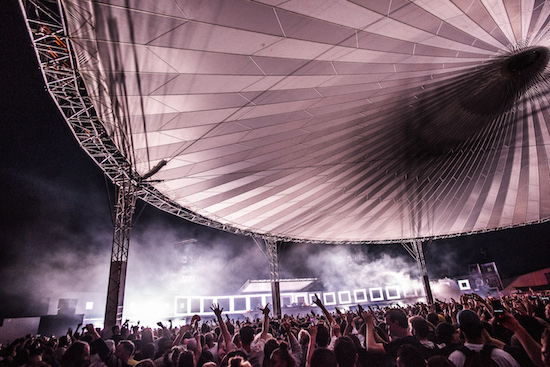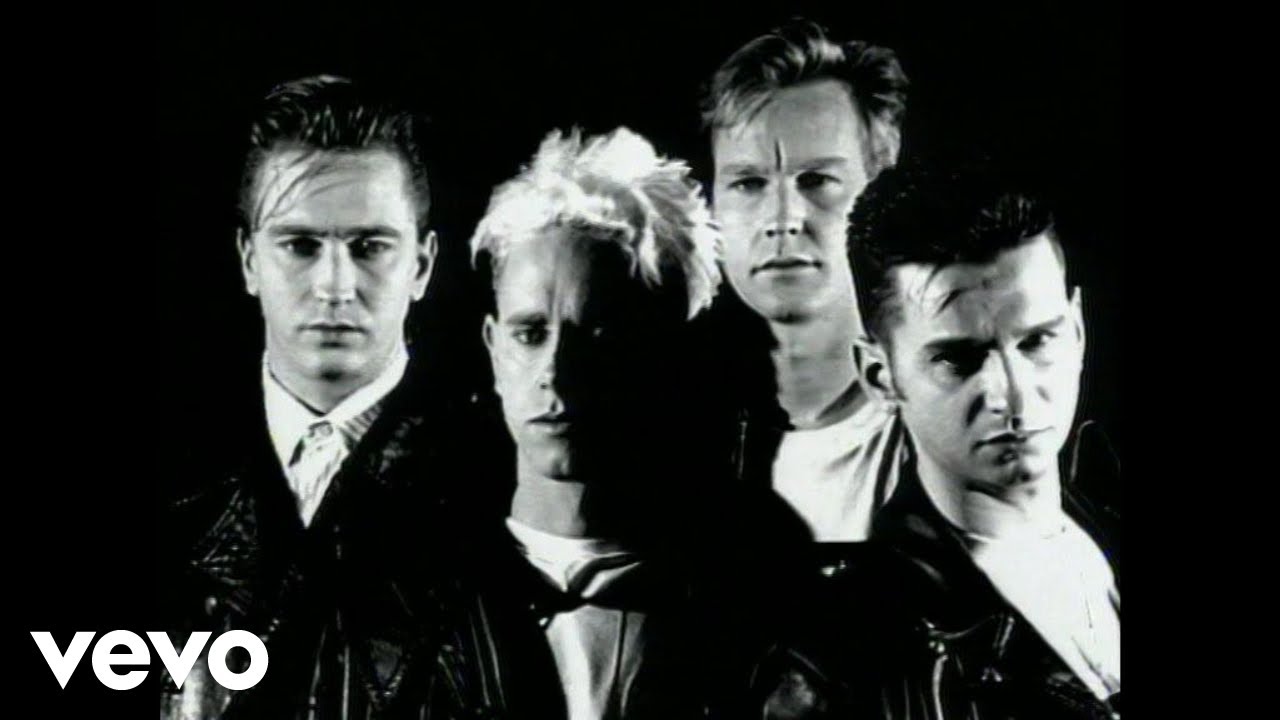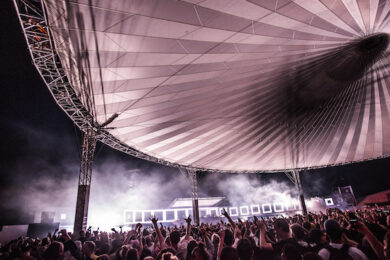Photo courtesy of Niels Cornelis Meijer
Late into the afternoon during the penultimate day of this year’s Dekmantel Festival, Vancouver’s Jayda G was greeted with a surge of energy as the sounds of TLC’s 1994 hit ‘Creep’ soon rolled in to close her set at the Boiler Room stage. It was an hour that had earlier seen the DJ and producer build smoothly from funk and soul selections such as The Staple Singers ‘Let’s Do It Again’ and Toni Smith’s ‘Ooh, I Like The Way It Feels’ through to glorious, diva-inflected garage house cuts. Beamed out from the well-placed speaker stacks – reliably found across each of the festival’s stages – under the sublime sunshine that graced the forest surroundings of the Amsterdamse Bos for most of the festival’s stay there and pulled together with aplomb by a DJ unafraid to let a crowd see just how taken she is by the music she’s playing – all full body movements and bold sing-alongs (slow clap for the online commenters at home bemoaning a lack of perfect, long blends while playing unquantised disco) – it was one of many fine sets across the weekend that hinted that the festival is still pushing out beyond the narrow expectations frequently placed on a house and techno festival.
Later that evening, Arca & Jesse Kanda closed out the greenhouse making their Dekmantel debut, with their combination of Arca’s chaotic, anything goes DJing and Kanda’s distinctive, warped visuals. Robert Glasper also treated the greenhouse to something beyond the techno, house and disco that had come to exemplify Dekmantel’s early years on the festival’s first afternoon at the Amsterdamse Bos, having kicked off earlier in the week with a series of opening concerts at a number of venues just across the river from Amsterdam’s centre which saw sets from Steve Reich, Gas, Actress, Dopplereffekt, Marcos Valle and more. Performing as part of his Experiment quartet, Glasper’s smooth, accessible jazz swing provided an excellent stepping point between Byron The Aquarius before him and Joey Anderson, by now a Dekmantel regular and a man who always delivers, just after. Beatrice Dillon was given free rein of the Selectors stage for almost two hours in the Sunday evening sun to show off the reaches of her collection, her sets frequently crossing between Bristolian hybrid techno, little-known reggae and dub cuts and leftfield party-starting curios.
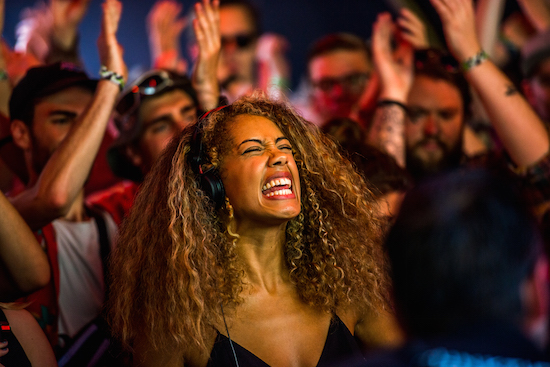
Jayda G – photo courtesy of Yannick van de Wijngaert
The collective also paid close attention to what had worked before of course too though. Fresh from his standout step up to the main stage on the closing afternoon of last year’s festival, Palms Trax brought it home again in a similar main stage slot this year, airing personal favourites such as Don Carlos’ ‘Alone’ and S-Tone’s 1992 remix of ‘Everything…’ by Montego Bay as well as classics in the form of Davina’s ‘Don’t You Want It’ and lesser known, suitably sunshine-soaked disco and soul cuts. It’s a joy to watch him play on that stage, as he continues to prove himself as one of the world’s most in-form DJs. Red Light Radio’s stage also returned though this year felt like the first where full attention had been paid to highlighting its presence on site. The previous red box studio was this year converted into a hut complete with roof and chimney. Over the weekend, the likes of Joey Anderson, Inga Mauer, Phuong-Dan and more stopped by for second, more intimate sets – Mauer’s set at the stage was a particular highlight – while others played their only sets of the weekend, such as Bucharest-based Borusiade and local hero Orpheu The Wizard.
The Amsterdamse Bos remains a perfect main hub for the festival, with its well-placed, expertly programmed and curated various stages. With almost 10,000 tickets sold each year, and a site small enough to take around 10 minutes to walk across, I also found myself marvelling more than once, as I have each year I’ve visited, at just how tightly run the whole operation is – no area felt uncomfortably busy throughout the weekend. As the capacity has ever so slightly grown in recent years and the festival’s popularity across Europe, particularly in Britain, has seen an even bigger surge, with sell-out dates edging further forward every year, Dekmantel has remained a festival for in-the-know lovers of dance music and its myriad forms – neither too ‘heads-y’ nor pandering to a lowest common denominator. The most obvious factor in ensuring the Dekmantel crew’s firm balance between those two grounds has been their commitment to taking risks – sometimes in more obvious ways than others – which brings me to assessing just what was learned at perhaps the best edition yet of Dekmantel’s flagship festival.
The warm-up slot doesn’t always have to be reserved for your ‘smaller’ bookings
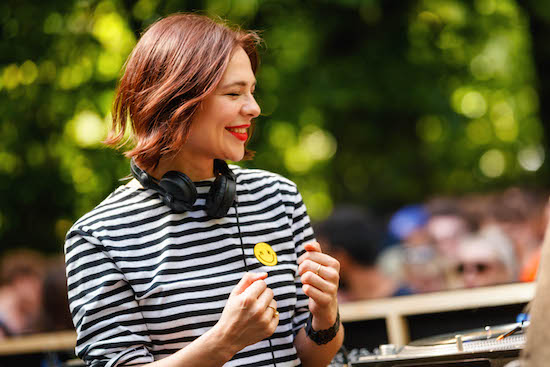
Nina Kraviz – photo courtesy of Bart Heemskerk
When pulling together the line-up for this year’s festival, and most importantly working out just how to programme it all, Dekmantel could have no doubt opted for even more big names than filled the billing over the weekend – that’s not to say of course that it was lacking in surefire ticket sellers. Simply put, that would just be lazy though. Admittedly, a number of the DJs and artists featured across the weekend have played the festival numerous times since it began in 2013 – some have even played every year – but Dekmantel have continued to look for new ways to present those acts year on year, to offer returning audiences something fresh and different, and use their various stages to their fullest advantage.
That meant, for example, that this year Nina Kraviz and Marcel Dettmann opened the Selectors Stage (surely one of the best at any European festival) amongst the willow trees on Friday and Saturday respectively following late-night sets in 2016 in the cavernous, disorientating UFO tent, while Motor City Drum Ensemble did the same on Sunday fresh from stepping up to close the main stage at last year’s festival. There was no doubt that this helped get people through the doors earlier than previous years in order to catch glimpses of each of them, but it also offered each DJ an opportunity to take a different approach than they might on the far bigger stages at peak time. For Nina Kraviz on Friday, this meant using the vast majority of her almost four-hour set to swap the high-energy, trippy techno that frequently characterises her sets for a generous serving of disco, with a heavy focus on the Italo variety – Charlie’s ‘Spacer Woman’ and Yazoo’s ‘Situation’ drew strong early reactions from the sizeable crowd that had arrived within the first hour. Within just a couple of hours, the area had filled out as Kraviz contended with some unfortunate, but natural, needle trouble, having flown home to Russia to collect a number of records especially for the set. The last 30 minutes saw her bring it home with a number of dubstep records via Roots Manuva’s ‘Witness Dub’.
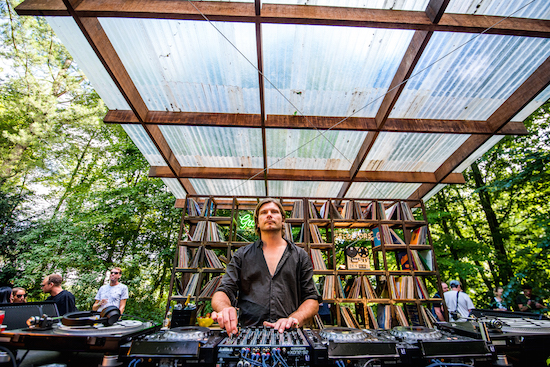
Marcel Dettmann – photo courtesy of Yannick van de Wijngaert
Having recently contributed to Dekmantel’s Selectors compilation series, specially licensing a number of his personal EBM and new wave favourites for the release, it always made sense that Marcel Dettmann’s opening slot would be populated by music of that kind. Gradually building up over the course of four hours, his set made way for classics such as Depeche Mode’s ‘Enjoy The Silence’, fitting in alongside lesser known older, industrial-tinged material. Attracting one of the largest crowds the stage saw all weekend, he brought it home in the set’s final moments with hands-in-the-air house music – the kind you’d be hard pressed to find him playing at many other gigs – airing tracks like Truth’s ‘The Start’.
Booking headliners doesn’t have to mean playing it safe
The last three years have seen Jeff Mills close out different days on the main stage at Dekmantel, and while he no doubt continues to be a surefire hit with Dekmantel’s crowds, a fourth year headlining would have been, well, fairly boring. Returning to the festival this year, he took to the greenhouse stage on Friday evening alongside Tony Allen, as part of their ongoing series of collaborative, improvised live shows which first came together from a joint appearance last year at Paris jazz spot New Morning.
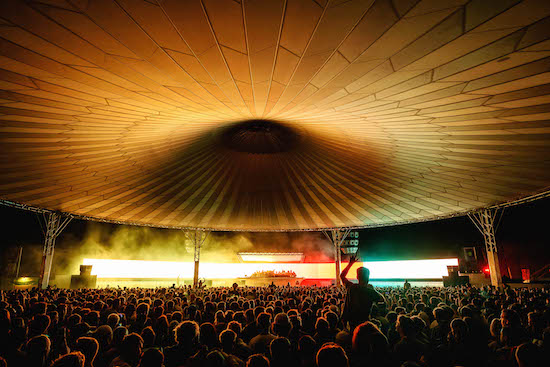
Photo courtesy of Bart Heemskerk
Sure, a Detroit legend featured amongst the headline ranks in Mills’ place this year, in the form of Robert Hood on Friday night, but Saturday and Sunday’s honours fell to Ben UFO and Hunee & Antal respectively. As one of the most respected DJs to emerge from the UK in the last decade, it was perhaps fitting that Ben UFO would be tapped up for such a gig, but that didn’t make it any less a bold move on Dekmantel’s part. After all, he’s a DJ that’s continually shied away from the trappings of what one might expect from the big room club DJ, or, in this case, big festival stage. As he admitted yesterday in a post made via his Facebook page, he doesn’t think of himself as a “‘main stage’ kind of DJ,” but, he adds, “I think I did it in my own way”.
Across 90 minutes, the Hessle Audio co-founder deftly balanced cuts befitting of his main stage closing status such as fellow Hessle Audio member Pangaea’s recent edit of Nomad classic ‘Devotion’ and a closer of Overmono’s anthemic remix of ‘Degreelessness’ from Nathan Fake with distinctly UK cuts such as Untold’s ‘Targa’ and Champion & Riko Dan’s ‘Landslide’, also finding room for pulsating techno, speed garage, breakbeats and Príncipe cuts along the way. “I’ll certainly never be the kind of person that can sleepwalk their way through three of these kinds of sets in a single weekend,” he said, but his Saturday night set banished any doubt anybody might have had about Dekmantel’s decision. With this in mind, it would be particularly great to see Dekmantel harness these riskier bookings in some quarters, including the addition of acts such as Robert Glasper and Arca & Jesse Kanda, and further diversify bookings in coming years, particularly with regards to inviting more women, specifically women of colour, to play at the festival.
Helena Hauff has no mercy
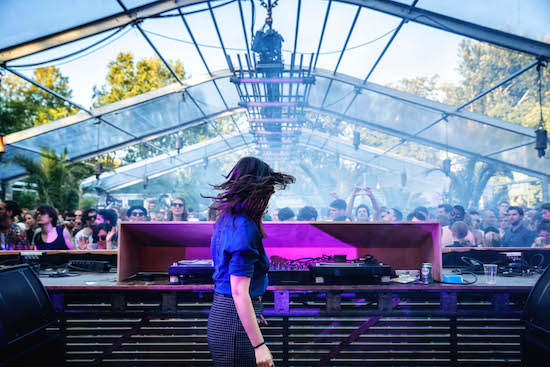
Helena Hauff – photo courtesy of Bart Heemskerk
Less a thing learned, more a fact compounded, after laying witness to a devastatingly punishing 90-minute set from the Hamburg-hailing DJ, who we all know by now is certainly one of the world’s best, in the greenhouse. The somewhat unharmonious juxtaposition of Hauff’s ripping, high-BPM techno and electro and the greenhouse setting, standing amongst the potted trees that line the area directly under the sun that graced the site through the festival’s final day, served only to spin my head out further – just the ticket for experiencing the menace that Hauff’s selections have to offer.
Putting aside the EBM and new wave sounds that can sometimes be heard in Hauff’s sets, she built relentlessly through the 90 minutes, throwing increasingly more audacious techno at the crowd that filled the stage, eventually approaching a sound akin to hardstyle. Tracks would steamroll through the greenhouse, very briefly giving way, before coming back all over again, each time harder and more aggressive. It’s difficult when playing techno of this kind to build momentum rather than simply throw everything all out at once, but Hauff’s 90 minutes were a prime display in just how to play this music, proving that pacing and sequencing are always important, no matter how hostile the music you play is.
Festival back-to-backs can be inspired affairs
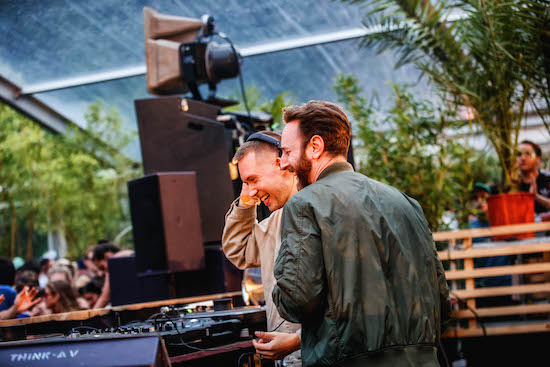
Joy Orbison and Jon K – photo courtesy of Bart Heemskerk
A spot of rain for around 45 minutes of Saturday evening only served to boost the atmosphere at the greenhouse during Joy Orbison and Jon K’s almost three-hour back-to-back set as those previously lounging on the grass next to the stage soon joined the throng inside as the pair began ratcheting up the energy levels having started slowly hovering between the 100 and 120 BPM mark, easing people in with serene, jazz-inflected house through much of the early part of their set while finding a course from those sounds to dancehall cuts without throwing off the crowd which never waned once through their set. With the home strait nearing and the heavens opening, the pair began soon one-upping each other, though this was no ego match with the two in sync throughout their set together. UK garage classics such as Wookie’s ‘Down On Me’ and KMA Productions’ ‘Cape Fear’ soon got an outing, while more dancehall from the likes of Equiknoxx and Ghetto Vanessa also featured, alongside LSDXOXO’s R&B-ballroom hybrid ‘Dope Dick Dealer’ and a raft of bass and minimal-rooted breaks that wouldn’t sound out of place in sometime DJ pal of Joy Orbison’s, Evan Baggs. If anybody happens to know what that one might be, I’m desperate to track it down.
The final night of Dekmantel left us spoilt for choice between sets from Helena Hauff and Blawan over at Boiler Room, British Murder Boys at the UFO and I-F at the greenhouse, but it was never in doubt that I’d finish my weekend at the Selectors stage to catch one of Call Super and Objekt’s by now legendary back-to-back sets – a set that I know they had been casually swapping ideas for for months. The two friends once again proved themselves to be the best DJ duo you could possibly see play right now with their technically fluid mixing style – chops and cuts with the mixer were a frequent feature – and balanced selections seeing them work across a wide tempo range, pulling together the modern balearic house of SW. on SUED, ‘90s ‘Plastic Dreams’-sampling breaks from Frankie Bones, techno donk by Timo Maas and a whole host more across their three hours. A brief volley of jungle in the final hour did its bit to ensure the sizeable crowd’s limbs were still in working order before the finale to a beautifully paced set that had also broken off for a sub-100 BPM dancehall detour earlier. The set wasn’t without its more obvious crowd-pleasing moments either, as Steve Gurley’s two-step remix of ‘Red Alert’ from Basement Jaxx gave way to the original while Sonique (‘It Feels So Good’), Crystal Walters (‘Gypsy Woman (She’s Homeless)’) and even Tears For Fears’ ‘Everybody Wants To Rule The World’ all featured too, before the pair bowed out on a French touch classic from Falcon & Bangalter. Theirs was a set that walked a tightrope between heads down and unashamedly cheesy and it reaped the rewards for it. As their final track faded out and I walked away from the willow tree of the Selectors stage for the last time this year, the sinking realisation that it was all over for one year more was unshakeable.
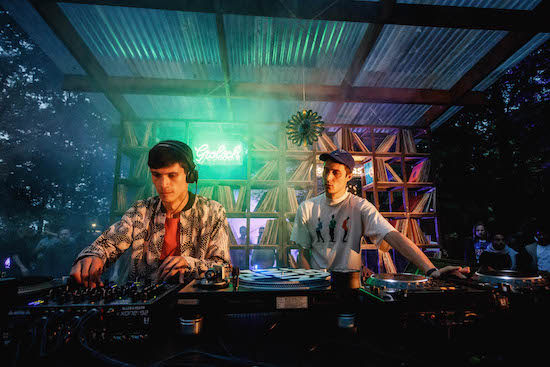
Call Super and Objekt – photo courtesy of Bart Heemskerk
Scroll just below to find a YouTube playlist featuring some of the tracks heard around the site at this year’s Dekmantel Festival.

